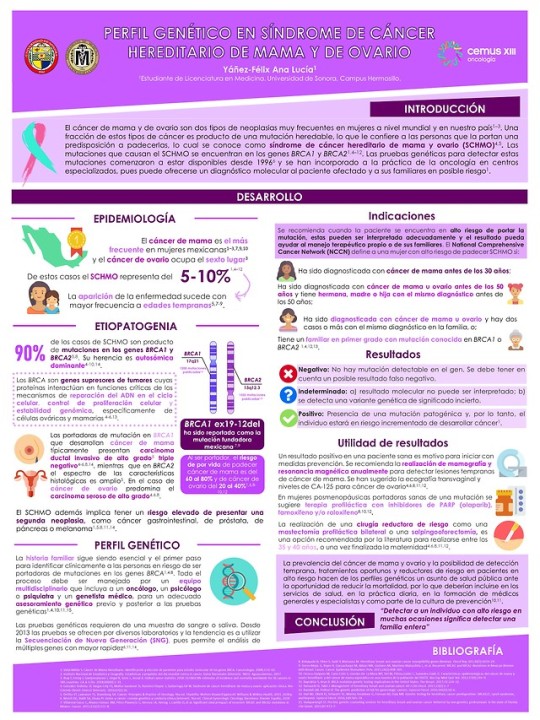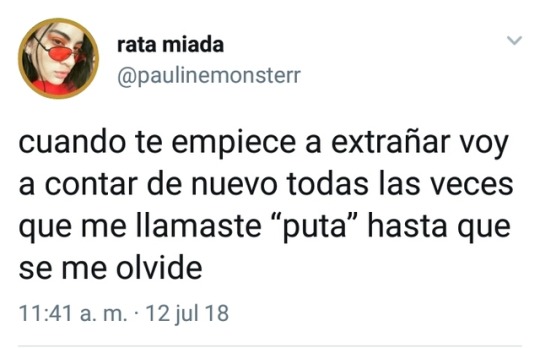22. Med student 4/6. Class of 2020. Trying to take on the world. MEX I CAN🌵
Don't wanna be here? Send us removal request.
Photo

Perfil genético en síndrome de cáncer hereditario de mama y ovario.
Autor: Yáñez Félix Ana Lucía
Bibliografía: Hipervínculos 1. Vidal-Millán S. Cáncer de Mama Hereditario: Identificación y elección de pacientes para estudio molecular de los genes BRCA. Cancerología. 2008;3:51–61. 2. Instituto Nacional de Estadística y Geografía. Estadísticas a propósito del día mundial contra el cáncer. Datos Nacionales [Internet]. INEGI. Aguascalientes; 2017. 3. Bray F, Ferlay J, Soerjomataram I, Siegel R, Torre L, Jemal A. Global cancer statistics 2018: GLOBOCAN estimates of incidence and mortality worldwide for 36 cancers in 185 countries. CA A J Clin. 2018;00(00):1–31. 4. González-Teshima LY, Vargas-Cely FS, Muñoz-Sandoval JS, Ramírez-Cheyne J, Saldarriaga-Gil W. Síndrome de cáncer hereditario de mama y ovario: aplicación clínica. Rev Colomb Obstet Ginecol [Internet]. 2016 Mar 31;67(1):36. 5. DeVita VT, Lawrance TS, Rosenberg SA. Cancer: Principles & Practice of Oncology. 9na ed. Filadelfia: Wolters Kluwer/Lippincott Williams & Wilkins Health; 2011. 2638 p. 6. Mutch DG, Babb SA, Disaia PJ. Genes y cáncer: consejo genético y conducta clínica [Internet]. 9na ed. Clinical Gynecologic Oncology. Barcelona: Elsevier España; 2018. 7. Villarreal-Garza C, Alvarez-Gómez RM, Pérez-Plasencia C, Herrera LA, Herzog J, Castillo D, et al. Significant clinical impact of recurrent BRCA1 and BRCA2 mutations in Mexico. Cancer [Internet]. 2015 Feb 1;121(3):372–8. 8. Kobayashi H, Ohno S, Saski Y, Matsuura M. Hereditary breast and ovarian cancer susceptibility genes (Review). Oncol Rep [Internet]. 2013 Sep;30(3):1019–29. 9. Torres-Mejia G, Royer R, Llacuachaqui M, Akbari MR, Giuliano AR, Martinez-Matsushita L, et al. Recurrent BRCA1 and BRCA2 Mutations in Mexican Women with Breast Cancer. Cancer Epidemiol Biomarkers Prev [Internet]. 2015 Mar 1;24(3):498–505. 10. Orozco-Quiyono M, Cano-Colín S, Gorráez-De La Mora MT, Del M, Chima-Galán C, Saavedra-Lladó D. Características epidemiológicas del cáncer de mama y ovario hereditario y del cáncer de mama esporádico en una muestra de la población del ISSSTE. Rev Esp Méd Quir Vol. 2012;17(4):291–9. 11. Bayraktar S, Arun B. BRCA mutation genetic testing implications in the United States. The Breast [Internet]. 2017 Feb;31:224–32. 12. Yamauchi H, Takei J. Management of hereditary breast and ovarian cancer. Int J Clin Oncol [Internet]. 2017 Feb 28 [cited 2018 Sep 19];23(1):1–7. 13. Randall LM, Pothuri B. The genetic prediction of risk for gynecologic cancers. Gynecol Oncol [Internet]. 2016;141(1):10–6. 14. Hall MJ, Obeid EI, Schwartz SC, Mantia-Smaldone G, Forman AD, Daly MB. Genetic testing for hereditary cancer predisposition: BRCA1/2, Lynch syndrome, and beyond. Gynecol Oncol [Internet]. 2016;140:565–74. 15. Vadaparampil ST. Pre-test genetic counseling services for hereditary breast and ovarian cancer delivered by non-genetics professionals in the state of Florida. Clin Genet [Internet]. 2015;87:473–7.
#breast cancer#Ovarian cancer#Poster#Hereditary breast and ovarian cancer#CEMUS#Medicine#Medblr#Medstudyblr#studyblr#medstudent#medschool#breast and ovarian cancer#CEMUS2018
18 notes
·
View notes
Text
How to read a scientific article
Hey y’all! This post is aimed at people who are making the transition from textbook-based science classes to article-based science classes. Scientific journal articles are dense compared to textbooks and aren’t written with the intent to teach basic concepts but rather with the intent to expand scientific knowledge. It can often be very confusing to figure out what is going on. Here’s how I was taught to read them 10+ years ago and how I still approach them today.
(I) After reading the title, start for real with the Results section.
Why would you do this when you know the abstract will give you a basic overview of the study and the introduction will set the context? Because you want to be an active reader. You want to figure out what happened in this study in a way that makes sense to you rather than be able to parrot what the author’s say happened. This is the major difference between reading a textbook (where you need to regurgitate the information later) and reading an article (where you need to be able to intelligently discuss the content either in class or in writing).
Look at the tables and figures first. Can you tell what the independent variables were? What the dependent variables are? What might the relationship between them be? What trends or patterns do you see? Depending on your style, it may be a good idea to mark up your document with this information or jot some notes down somewhere else.
Now read the text part of the results. What parts of the figures are the authors choosing to highlight in the text? Are there any results buried in the text that you can’t connect to part of a figure?
Now pause and think. What is the most important result of the study? Highlight where this appears in the text and figures. Remember that important doesn’t necessarily mean statistically significant! A good p-value doesn’t signify real-world meaning; you need to make that connection yourself. Take a moment in this step to notice what results still don’t make sense to you– no need to panic or write questions down yet because you haven’t read the rest of the paper.
(II) Get the gist of the Methods.
Chances are your professor did not assign you this reading with the intent to make you replicate the study. You don’t have to understand every sentence (or even most sentences!) of the methods unless you’re an advanced graduate student. You do have to be able to explain in layman’s terms what the researchers did.
Particularly important questions to answer that can be found in the text include: What were the independent variables? What were the dependent variables? What variables were controlled for, either statistically or through researcher manipulation? What statistical methods were used to look for an association? In health research, we use the acronym PECOT to deconstruct method’s sections.
P = population– who was being studied?
E = exposure– what variable were the researchers trying to determine the impact of? This might be an intervention (ie., a smoking cessation video) or something outside researchers’ control (ie., at least 5 years of daily smoking).
C = comparison– who is the population of interest going to be compared to? This may be a formal control group (ie., smokers who were shown a video on handwashing) or something outside researchers’ control (ie., former smokers of a similar demographic background who haven’t had a cigarette in 5 years).
O = outcome– what were the researchers looking for? This is also known as the independent variable.
T = time– how long were participants/subjects tracked and when were measurements taken?
(III) Read the Introduction.
Now that you have a very good idea about the design and results of the study, you’ll be better able to understand the introduction of the study. The basic goal of an introduction in any scientific paper is to explain why the study happened. The background may give you some helpful context, or it may be redundant at this point. I typically don’t spend much time on the introduction except for the end where the study purpose/research question and hypotheses are usually written. Mark these in the text! You should already have a good idea of the study’s purpose from the methods and results. Here’s some questions you should answer internally or in your notes at this point:
Did the methods align with the purpose?
Did the results support the hypothesis?
What are the scientific implications of these results?
(IV) Read whatever is at the end of the article: Discussion, Conclusion, Reflection, Limitations, Research Implications etc.
It is very important that you save these sections for last because these sections are where researchers tell you what to think of the results. You need to be prepared to critically engage with their interpretation of the results by already having your own. That’s what the three questions above are about! Of course, the discussion was probably written by multiple advanced scientists and you are but a lowly student. That doesn’t mean you should accept their conclusions without seeing their logic. As you read the discussion, think about these questions:
Do the researchers think the results support the hypothesis?
How are the researchers interpreting the primary results? [Bonus: what other interpretations are there, and are they mentioned?]
What do the researchers think the scientific implications of these results are?
What limitations do the researchers acknowledge, and how could those limitations be impacting the results?
(V) Synthesize it.
Try to boil down everything in the paper to just a few sentences that an 8th grader could understand. Whether you think through it internally or write it down is up to you. I usually print out my readings and write my synthesis on the blank back page using the following sentences starters:
The researchers wanted to know whether…
They found that…
This means that…
Taking the time to write the synthesis and any lingering questions you have can be really helpful if, like me, you do reading far in advance of class and need a quick refresher to glance at before class starts. It can also be helpful for paper writing or exam studying later. Consider revising your synthesis after you participate in the class discussion or hear your professor’s take on the article in lecture. Don’t rely on the abstract– that’s someone else’s synthesis, not yours.
—
I hope this was helpful!! Don’t feel bad if this process is ridiculously time consuming. I have spent probably 3-4 hours on a 5-page study before. The goal of science writing is to be as concise as possible, which makes reading short articles more difficult than longer ones. I am a graduate student at a top American university, and I typically read 9-12 articles per week this deeply. If a professor assigns more than 4 research study articles per week for a regular course, make sure they explain what students are supposed to be getting out of each article so you can target your reading better. Chances are, you can skip some sections and focus on coming to class with clarifying questions rather than a firm understanding.
Happy reading!!
@phd-one-day
7K notes
·
View notes
Text
self discipline tips
here are tips I discovered very recently:
something is better than nothing. 5 minutes of work are better than zero. Just because you missed something on your schedule doesn’t mean you can’t still work on it, even for 5 minutes. Grow and build on this.
second drafts / reviews can be done after.
Don’t think you are going to do your very best work on the first try. Take the weight of perfectionism off your shoulders.
don’t think about doing it. just do it as fast as you can.
build on your productivity, not your failures.
If you come from a past of procrastinating and now feel motivated to change and discipline yourself, do NOT try to do everything at once.
if you have a set of different goals to accomplish, begin with the most important one. Wait until the rotine of working for that one settles in (you feel productive and comfortable-ish), and then begin with the next. Repeat.
this way you’ll be building your way up and not juggling everything at the same time, hoping everything works out.
be patient with yourself, you’ll get there!
set smaller deadlines for your goals
have monthly and weekly-ish deadlines
e.g. if you are doing a project, due 22nd Feb, set personal deadlines, like have Introduction written by 2nd Feb, have Methods written by 10th Feb, have project complete by 18th Feb.
take them as seriously as you possibly can, don’t miss out on yourself.
write realistic daily tasks and don’t stop until you finish them. after them you can do whatever you want
on writing realistic daily tasks, the secret is knowing you can only do so much in one day, but trusting you can accomplish everything in the course of any period of time (a week, or 2 weeks or a month, etc.) because you will combine the work from all these different days.
it’s very tempting to write down all the tasks you need to accomplish in one day to just get over with it, but the real deal is you won’t accomplish half of them. You’ll feel very unproductive then, wich leads to demotivation.
spread daily tasks in the time necessary.
have a consistent sleep schedule.
if your mind isn’t ready everything will fall apart.
have one rest day per week where you plan nothing, do whatever you want except studying. this can be harder than you expect!
(don’t forget these are effective only if you actually put them into practice! good luck babes!!)
63K notes
·
View notes
Text
“I need solitude. I need space. I need air. I need the empty fields round me; and my legs pounding along roads; and sleep; and animal existence.”
— Virginia Woolf, The Diary of Virginia Woolf (via thatkindofwoman)
43K notes
·
View notes
Text
“I forgot everything. Your lips were so beautiful.”
— F. Scott Fitzgerald, Lipstick
2K notes
·
View notes
Text
When your hair is wavy/curly sometimes there is a fine line between “messy romantic waves” and “evil witch who lives in the woods.”
305K notes
·
View notes
Text
people who suggest getting breakfast together as a hangout plan are the kind of people you want to hang onto
192K notes
·
View notes
Text
“Stay close to anything that makes you glad you’re alive.”
— Unknown (via cwote)
82K notes
·
View notes
Text
100 libros que todo el mundo debería leer a lo largo de su vida
Post original por María Moreno para Universia.
1. 1984 - George Orwell 2. Al faro - Virgina Woolf 3. American Gods - Neil Gaiman 4. Ana Karenina - Lev N. Tolstói 5. Cien años de soledad - Gabriel García Márquez 6. Cinco horas con Mario - Miguel Delibes 7. Crimen y castigo - Fiódor Dostoyevski 8. Crónicas marcianas - Ray Bradbury 9. Cumbres Borrascosas - Emily Brontë 10. Diez negritos - Agatha Christie 11. Don Juan Tenorio - José Zorrilla 12. Don Quijote de la Mancha - Miguel de Cervantes 13. Drácula - Bram Stoker 14. El Aleph - Jorge Luis Borges 15. El Alquimista - Paulo Coelho 16. El árbol de la ciencia - Pío Baroja 17. El arte de la guerra - Sun Tzu 18. El buscón - Francisco de Quevedo 19. El conde de Montecristo - Alejandro Dumas 20. El Diaro de Ana Frank - Anne Frank 21. El extranjero - Albert Camus 22. El gran Gatsby - Francis Scott Fitzgerald 23. El guardián entre el centeno - JD Salinger 24. El nombre de la rosa - Umberto Eco 25. El manifiesto comunista - Karl Marx y Friedrich Engels 26. El poder y la gloria - Graham Greene 27. El principito - Antoine de Saint-Exupéry 28. El proceso - Franz Kafka 29. El retrato de Dorian Gray - Oscar Wilde 30. El ruido y la furia - Willliam Faullkner 31. El señor de las moscas - William Golding 32. El tambor de hojalata - Günter Grass 33. El tartufo o el impostor - Moliére 34. El viejo y el mar - Ernest Hemingway 35. Elogio de la estupidez - Erasmo de Rotterdam 36. En busca del tiempo perdido - Marcel Proust 37. Ensayo sobre la ceguera - José Saramago 38. Facundo - Domingo F. Sarmiento 39. Fahrenheit 451 - Ray Bradbury 40. Fiesta - Ernest Hemingway 41. Fortunata y Jacinta - Benito Pérez Galdós 42. Frankenstein - Mary Shelley 43. Fuenteovejuna - Lope de Vega 44. Grandes esperanzas - Charles Dickens 45. Guerra y paz - Lev Tolstói 46. Hamlet - William Shakespeare 47. Historia de dos ciudades - Charles Dickens 48. Aventuras de Huckleberry Finn - Mark Twain 49. Jane Eyre - Charlotte Brontë 50. La broma - Milan Kundera 51. La calle de los sueños - Luca Di Fulvio 52. La casa de los espíritus - Isabel Allene 53. La colmena - Camilo José Cela 54. La divina comedia - Dante Alighieri 55. La eneida - Virgilio 56. La galaxia Gutenberg - Marshall McLuhan 57. La familia de Pascual Duarte - Camilo José Cela 58. La historia interminable - Michael Ende 59. La ilíada - Homero 6. La isla del tesoro - Robert L. Stevenson 61. La metamorfosis - Franz Kafka 62. La mujer de blanco - Wilkie Collins 63. La naranja mecánica - Anthony Burgess 64. La náusea - Jean Paul Sartre 65. La Odisea - Homero 66. La piel del tambor - Arturo Pérez Reverte 67. La regenta - Leopoldo Alas 68. La república - Platón 69. La riqueza de las naciones - Adam Smith 70. La sombra del ciprés es alargada - Miguel Dellibes 71. La sonrisa etrusca - José Luis Sampedro 72. Las olas - Virgina Woolf 73. Las uvas de la ira - John Steinbeck 74. Los hermanos Karamazov - Fiódor Dostoyevski 75. Los tres mosqueteros - Alejandro Dumas 76. Lolita - Vladimir Nabokov 77. Los cuentos de Canterbury - Geoffrey Chaliger 78. Los miserables - Victor Hugo 79. Los santos inocentes - Miguel Delibes 80. Los viajes de Gulliver - Jonathan Swift 81. Luces de bohemia - Ramón del Vale-Incián 82. Madame Bovary - Gustave Falubert 83. Marinero en tierra - Rafael Alberti 84. Matar a un ruiseñor - Harper Lee 85. Medea - Eurípides 86. Moby Dick - Herman Melville 87. Niebla - Miguel De Unamuno 88. Oliver Twist - Charles Dickens 89. Orgullo y prejuicio - Jane Austen 90. Por quién doblan las campanas - Ernest Hemingway 91. Robison Crusoe - Daniel Defoe 92. Rojo y negro - Stendhal 93. Romancero gitano - Federico García Lorca 94. Sobre la libertad - John Stuart Mill 95. Ulises - James Joyce 96. Un mundo feliz - Aldous Huxley 97. Utopía - Tomás Moro 98. Veinte poemas de amor y una canción desesperada - Pablo Neruda 99. Viaje al centro de la Tierra - Julio Verne 100. Zorba el griego - Nikos Kazantzakis
0 notes
Photo

Podría enmarcar este tweet.
0 notes
Text
if i ever misgender you or use slang (bro, man, gurl, dude) that makes you feel even slightly uncomfortable please tell me because your gender identity and comfort is more important than any word i may use to refer to you
606K notes
·
View notes
Text
No te quiero para sólo un ratito, te quiero para todos los días, para verte despertar con tu pelo todo desordenado por las mañanas, para verte dormir con tus ojitos cerrados y tu carita tan pura, para verte siento tú.
623 notes
·
View notes
Text
I just want to dance around in lacy lingerie and oversized shirts and makeout on someones lap
112K notes
·
View notes
Text
white people be putting their parents in reitrement homes like its nothing while us mexicans still be rolling up to family pachangas with our great great grandmas ready to dance la chona
698 notes
·
View notes





